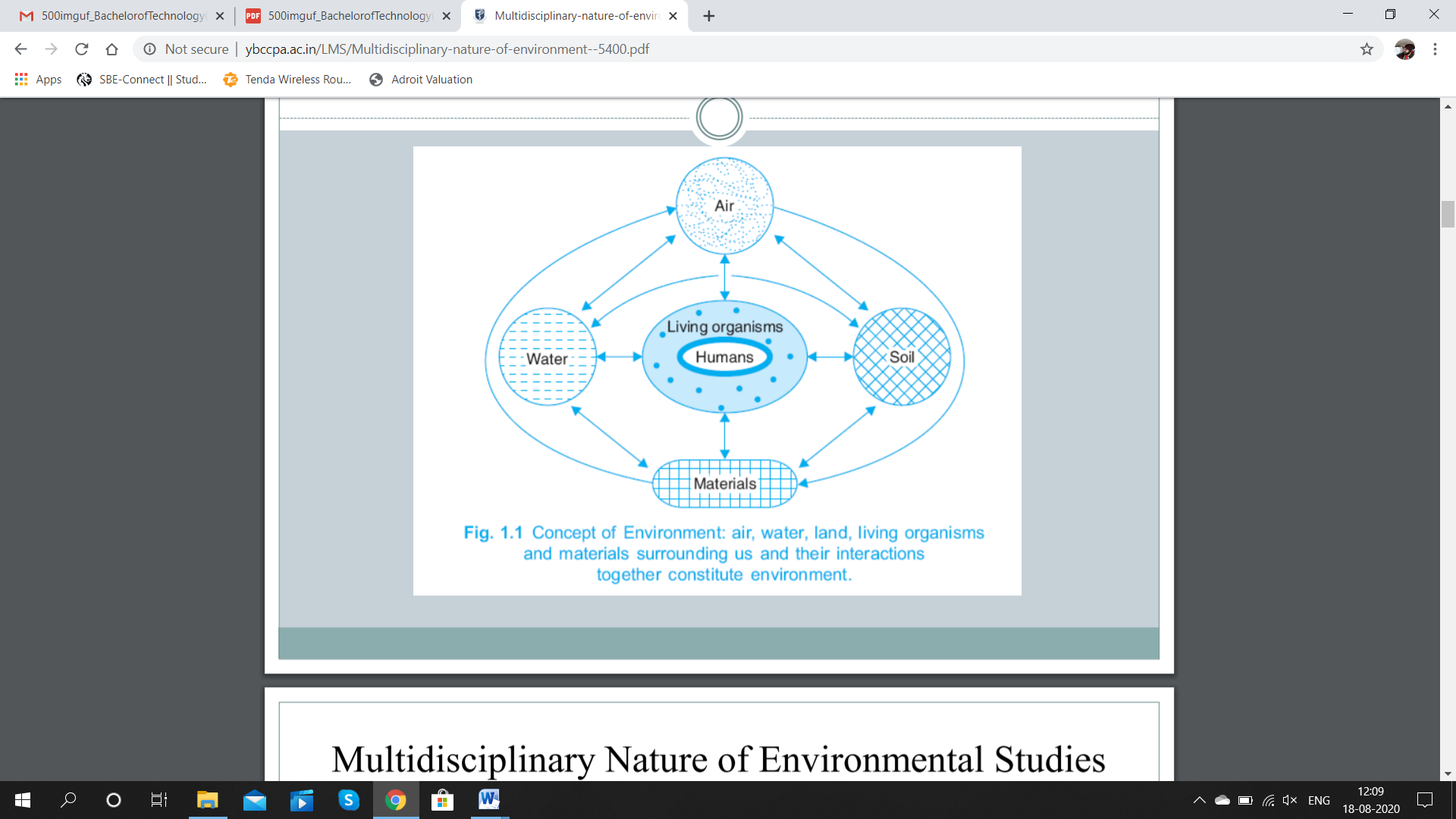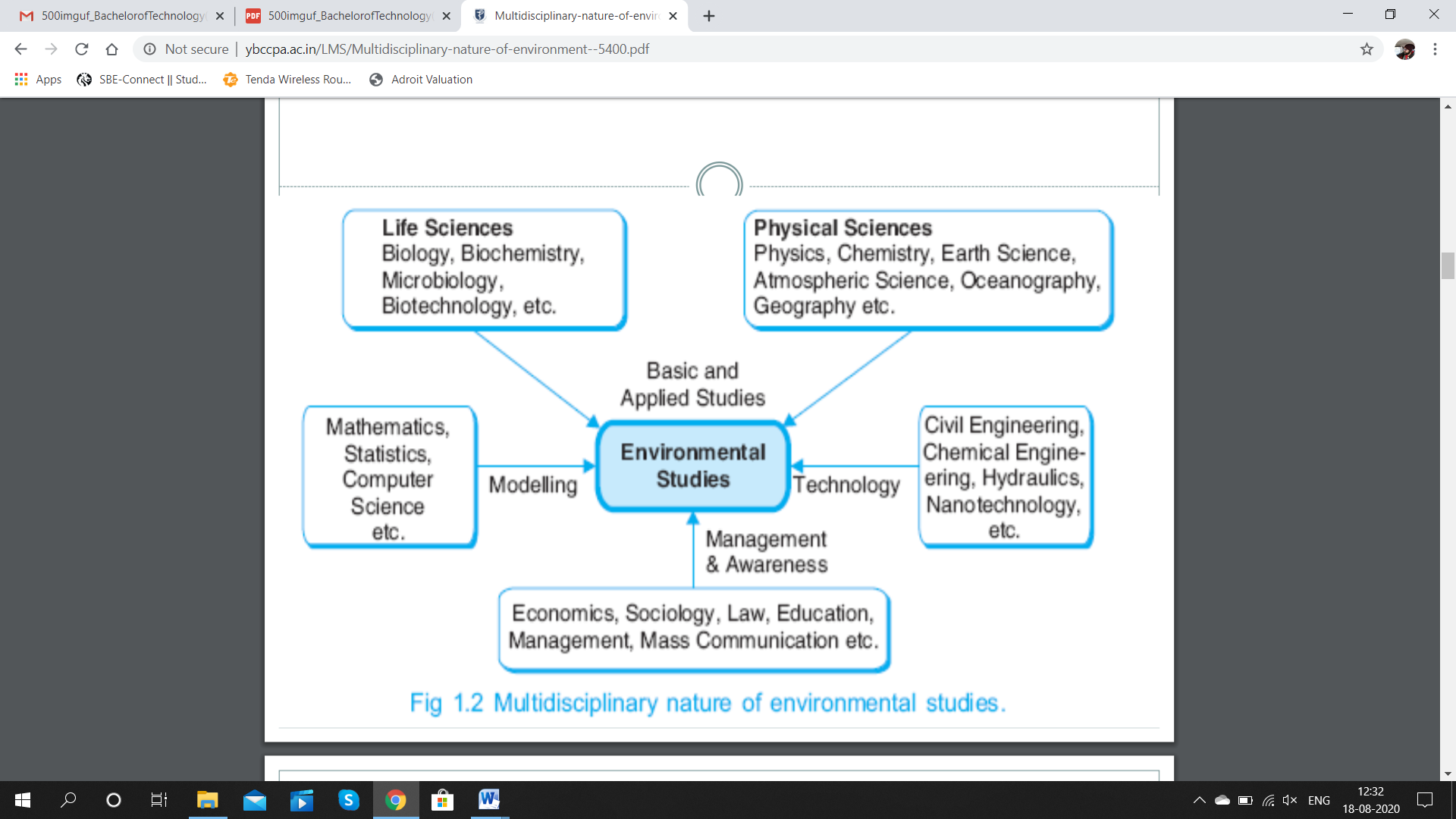UNIT 1
Introduction to environmental studies
The science of Environment studies is a multidisciplinary science because it depends on various disciplines like chemistry, physics, medical science, etc. It is the science of physical phenomena in the environment. It is inherently a multidisciplinary field that draws upon not only its core scientific areas, but also applies knowledge from other non-scientific studies such as economic, law and social science.
1. Physics:
- To understand the flux of material and energy interaction.
- To construct mathematical models of environment.
2. Chemistry:
- To understand the molecular interactions in the system.
3. Biology:
- To describe the effects within the plant and animal kingdom and their diversity.
4. Atmospheric Science:
- To examine the phenomenology of the Earth's gaseous outer layer with emphasis upon interrelation to other systems.
- It comprises meteorological studies, greenhouse gas phenomena, airborne contaminants, sound propagation phenomena related to noise pollution, and even light pollution.
5. Ecology:
- To analyse the dynamics among an interrelated set of populations, or a population and some aspects of its environment.
- These studies could endangered species, predator interactions, effects upon populations by environmental contaminants, or impact analysis of proposed land development upon species viability.
6. Environmental Chemistry:
- To study the chemical alterations in the environment.
- Principal areas of study include soil contamination and water pollution.
- The topics of analysis involve chemical degradation in the environment, multi-phase transport of chemicals and chemical effects upon biota.
7. Geo-science:
- It includes environmental geology, environmental soil science, volcanic phenomena and evolution of the earth's crust.
- In some classification systems, it can also embrace hydrology including oceanography.
8. Mathematics and Computer Science:
- It will help in environmental modeling and analysis of environment related data.
9. Economics:
- It deals with economical aspects of various components of environment.
10. Law:
- It helps in framing of environment related laws, Acts, rules and their monitoring.
11. Social Science:
- It helps in dealing with population and health related issues.
Definition
Environment as a word covers the sum of extrinsic forces, factors and suitable conditions, which are essential for the origination and survival of all life forms. ‘Environment’ is composed of every external factor that has influenced all living organisms since birth.
Environment is the aggregate of physical, chemical, biological and social components on Earth which are capable of causing direct or indirect effects on the survival of living and non-living things and their interactions.

Interaction of Air, Water, Land (Soil), Resources (Materials) with Living Organisms constitutes Environment.
Study of environment & its components is a multidisciplinary field as it consists of Science, Arts, Commerce, Mathematics and other specialized fields such as Geography, Topography, Anthropology, etc.
Environmental studies provide us a platform for the thorough study of living organism and its surroundings.

Depiction of Multidisciplinary Nature of Environmental Studies & its Components
- Environmental Studies as Applied Life Science: Life sciences including botany, zoology, microbiology, genetics, biochemistry, biotechnology, etc. help us in understanding the biotic components of environment and their interactions with each other and with abiotic components.
- Environmental Studies as Basic Physical Sciences: Core branches of physical sciences such as Chemistry, Physics, Geography, etc. give us an overview of chemical & physical structure of biotic components. Flow of energy transfer from one form to another also comes under this domain.
- Environmental Studies as Modeling Tool: It includes Mathematical Interpretations, Statistical Data Analysis, Computer Aided Analysis of Environment & its components.
- Environmental Studies as Technology: Branches of Civil Engineering, Chemical Engineering, Environmental Engineering, etc. have to deal with sustainable technological development without harming the environment in the form of Pollution Control, Waste Treatment and Reduction in overexploitation of natural resources.
- Environmental Studies as Management & Awareness: It covers all the rules regulations, laws and acts made in order to protect the environment and to create equilibrium between all life forms to sustain life and growth on earth.
Scope and importance
Like its multidisciplinary nature, scope of Environmental Studies is also wide as follows:
1. The study makes mindfulness among the individuals to think about different sustainable and non-renewable assets of the surroundings.
2. It gives the information about natural frameworks and circumstances related to human survival.
3. It gives fundamental idea about biodiversity and risks related to it.
4. The examination empowers one to create a cause & effect relationship of consequences caused by human activities of our natural surroundings.
5. It empowers one to choose most suitable alternative from available pool in order to reduce overuse of natural resources.
6. The awareness of Environmental Studies empowers ecologically educated residents by letting them know about the natural demonstrations, rights, rules, regulations, enactments, amendments in the existing environmental acts and so on to settle on proper decisions and choices for the insurance and improvement of the earth and its inhabitants.
7. The study reveals the social issues like over population, health, cleanliness and sanitation. It gives remedial measures to these issues in the most suitable manner.
8. The investigation attempts to recognize and create the eco-friendly skills and non-conventional technologies that would not create any hindrance in the pathway of development without putting an extra burden on environment.
9. It shows us the requirement for supportable usage of resources as these assets are acquired from our predecessors. Hence it is our responsibility to pass these on to our forthcoming generations without decaying their overall quality.
10. The scope of Environmental Studies is incomplete without its impact on employment opportunities in the form of Environmental-Journalism, Research & Development, Environmental Management, etc.
Importance :
1) Environmental studies help us to maintain ecological balance and equilibrium in the environment by providing a basic platform for interaction of environmental system and inter-related processes.
2) It gives information regarding the changes that takes place due to various factors and helps in gathering skills to analyze various environmental processes and the effect of human activities on them.
3) Environmental studies help to achieve sustainable development in order to achieve a state of optimum utilization of resources without affecting the needs of future generations. It ultimately makes us understand the relationship between development and the environment.
4) This field helps to educate people regarding their responsibilities and lawful duties towards the protection of environment.
5) Environmental study help us to analyze the impact of human activities on various processes occurring in water, air and land which leads to contamination and results in environmental pollution
6) It also deals with the most important issues like safe and clean potable water, health-hygiene and cleanliness of surroundings
7) The discipline provides knowledge of the environment and various environmental issues. It examines the scientific base for environmental, cultural and social concerns about our present energy needs, global climate changes, toxic emission and waste disposal.
8) Development and optimum utilization of energy resources is an important aspect of environmental studies.
9) Environmental acts, rules, regulations, law, amendments and fields like business administration, environmental engineering are emerging as new career opportunities under its domain.
10) To analyze the complex nature of vast bio-diversity on our planet, we need scientific approach of Environmental - Studies.
The concept of sustainability is composed of three pillars: economic, environmental, and social—also known informally as profits, planet, and people.
- Sustainability focuses on meeting the needs of the present without compromising the ability of future generations to meet their needs.
- Investors can be wary of companies that commit to sustainability. Although the optics can be beneficial to share price, investors worry about companies being transparent with their earnings results.
- Big brands often make pledges to sustainability, but it often takes a long time to achieve sustainability goals.
Sustainable Development is a concept that at its core is revolutionary, yet unfortunately incredibly difficult to pragmatically define. The history behind sustainable development is one that does not stretch far. Tensions that can be found within the concept of sustainable development are numerous, ranging from its ambiguous and vague definition, to the failure of attaining a universal pragmatic and operational framework. The great challenge that lies ahead with sustainable development is not only the need to educate it to the people, but to first define it in a way people will understand it.
References:
- Textbook Of Environmental Science By Deeksha Dave And E.Sai Baba Reddy, Cengage
- Publications.
- Text Book Of Environmental Sciences And Technology By M.Anji Reddy, Bs Publication.
- Comprehensive Environmental Studies By J.P.Sharma, Laxmi Publications.
- Environmental Sciences And Engineering – J. Glynn Henry And Gary W. Heinke – Prentice Hall Of
- India Private Limited.
- A Text Book Of Environmental Studies By G.R.Chatwal, Himalaya Publishing House